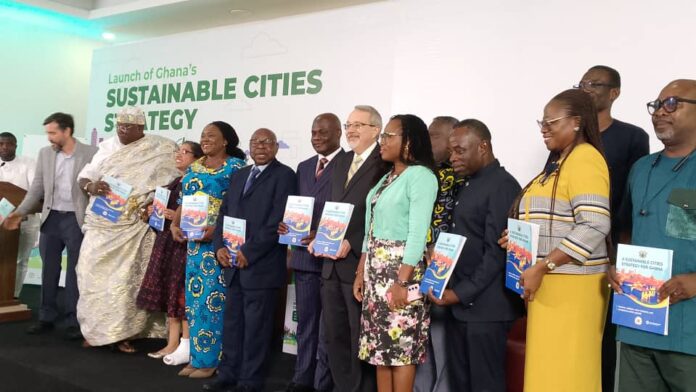The Ministry of Local Government, Chieftaincy and Religious Affairs, has officially launched the Ghana Sustainable Cities Strategy (GSCS), a visionary framework aimed at transforming Ghana’s rapidly urbanizing cities into inclusive, resilient, and prosperous urban centers.
Delivering the keynote address at the launch held at Alisa Hotel, North Ridge, the sector Minister, Ahmed Ibrahim, emphasised the critical need for coordinated and sustainable urban growth.
“Today marks another significant milestone in our collective journey towards building cities and towns that are more inclusive, green, resilient, and prosperous – cities that reflect the aspirations of every Ghanaian,” he said.
Ghana’s urban population currently stands at over 56.7%, expected to rise to approximately 60.7% by 2030, bringing both immense opportunities and complex challenges.
The Minister noted that unchecked urban expansion has led to infrastructure deficits, housing shortages, environmental degradation, inequality, and governance challenges.
The Ghana Sustainable Cities Strategy, developed with technical and financial support from the World Bank, provides a robust, data-driven blueprint to address these challenges.
It complements the revised National Urban Policy and aligns with global and continental development goals including the UN Sustainable Development Goals and Africa Union’s Agenda 2063.
Key strategic priorities of the GSCS include focusing on rapidly growing metropolitan areas, investing in critical sectors such as solid waste management, urban mobility, land management, and affordable housing, mobilizing local and private capital, and enhancing coordination among governments, traditional authorities, civil society, and development partners.
The Minister also highlighted the importance of multi-level and multi-sector collaboration, underscoring the role of local governments, traditional leaders, civil society, private sector, and citizens in shaping sustainable urban futures.
He emphasized a people-centered approach that leverages digital infrastructure to ensure transparency, inclusivity, and accountable governance.
“Our cities are living environments shaped by culture, heritage, and human values. Sustainable cities are not just about buildings and roads; they are about people,” Mr. Ibrahim stated, urging all Ghanaians to see themselves as stakeholders in this transformation.
The launch also marked a call for continued international partnerships, particularly with the World Bank, which has provided invaluable support throughout the development of the Strategy.



